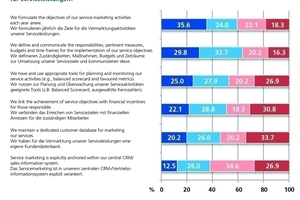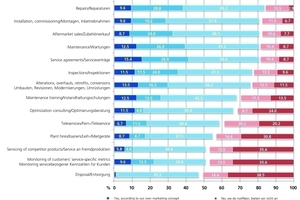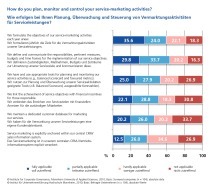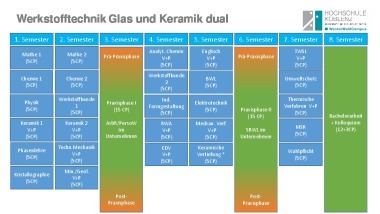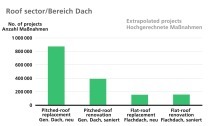Still room for improvement in industrial-service marketing
Against that backdrop, the Institute of Corporate Governance at Mannheim University of Applied Sciences and business consultants Peter Schreiber & Partner in Ilsfeld investigated how industrial commodity enterprises market their services. For their study of service marketing in the industrial commodities sector (see original title at the end of the article), general managers, directors, sales and marketing managers and other executives at 104 providers of industrial commodities were surveyed.
The results showed that most companies regard industrial services as an increasingly important success factor – along with sales volumes and profits – for keeping customers satisfied and loyal. In addition, the rendering of services is seen as an opportunity to stand apart from competitors and to gain stimuli for product innovations. Most companies perceive further potential for expanding sales and profits through services and wish to exploit that potential within the next three years.
Gap between ambition and reality
Most of the responding companies have broad service portfolios dominated by such “classics” as user training, installation and commissioning. Conversely, service agreements, the provision of equipment for loan or hire and the monitoring of service-specific indicators still do not belong to the standard range at many companies.
In marketing their services, the companies see quick reactions, qualified staff and high-quality services as the best way to distinguish themselves. They attach little priority to an attractive price-performance ratio.
Marketing concepts with grave deficits
One of those weak points is that one company in four still has no independent concept for marketing their services.
Even when such a concept is in place, it is unlikely to include concrete sales objectives and/or any specific differentiation of service products.
Only a good 60% of the surveyed companies actively market their own services by aggressively approaching their (product) customers in that respect. And only 46.2% of those companies have the special kind of customer database that is indispensable for active account acquisition.
A mere 40% of the companies systematically communicate with potential service customers in a target group-oriented manner by talking first and foremost to the (groups of) individuals with powers of decision for purchasing.
In their communication-policy activities, only 23.1% of the responding companies even attempt to provide suitable substantiation of the benefits they say their customers can expect from the proffered services.
In the course of the study, statistical analyses identified the existence of an elaborated marketing concept as a major success factor. Companies that have such a marketing concept were found to have, on average, a 15% higher share of service-specific sales and profits (measured against the total sales and profits) than that of companies with no conceptual basis in place for their marketing efforts.
The challenge: professional marketing
The study entitled “Vermarktung von Serviceleistungen in der Industriegüterbranche” (~service marketing in the industrial commodities sector) is available from the Institute for Corporate Governance at the Mannheim University of Applied Sciences or from Peter Schreiber & Partner for € 95.

